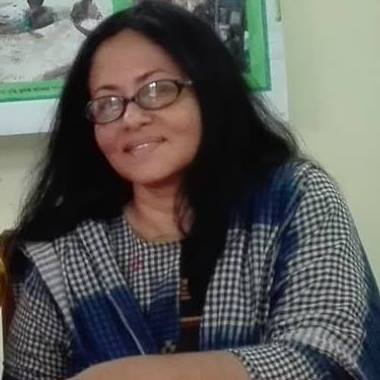“MH is a health issue, MH is a social issue and of course is a gender issue”
Whenever something is related to women, the issue is treated as less important. This year, the theme of menstrual hygiene day is education. With the theme, education about menstruation changes everything, MHM platform tends to go a step ahead. It is a step forward to break the taboos, break the silence and discuss menstruation openly.
 Interview with Mahbuba Haque Kumkum, Programme Manager, Ritu on the occasion of Menstrual Hygiene Day.
Interview with Mahbuba Haque Kumkum, Programme Manager, Ritu on the occasion of Menstrual Hygiene Day.
Menstrual Hygiene Day is comparatively new. Why it is important to mark the day?
Menstrual hygiene day (MHD or MH Day) is an annual awareness day, on 28 May, that aims to break taboos and raise awareness about the importance of good menstrual hygiene management (MHM) for women and adolescent girls worldwide. It was initiated by the German-based NGO WASH United in 2014
What is your focus on this day?
Theme of this year was Education about menstruation changes everything. We, the MHM Platform along with Simavi, Red Orange, TNO, BNPS and DORP organized a Roundtable on Challenges in ensuring MHM and way forward: Role of GO-NGO-Private sector. Roles of different stakeholders got emphasis in our discussion.
What are the most effective tools for creating awareness?
We are introducing BCC strategy in raising mass awareness. Non-judgmental and fact based information can only break the taboos and myths. Our project Ritu undertook various kinds of sensitization programs in order to aware our stakeholders and for creating mass opinion in favor of menstruation
Is the school curriculum enough for school students?
GoB has already incorporated MHM as well as SRHR in secondary school curriculum but it is not adequate.
How can the gaps be filled most effectively?
Comprehensive information needs to be incorporated in the NCTB. menstrual health is not a WASH or SRHR issue only. Because it relates to access to water, sanitation and hygiene as well as to women empowerment and gender relationships in a particular context, all these dimensions have to be incorporated in the text books.
Is the meaning we try to change the government mechanism or we try to include these subjects in the government mechanism?
We are advocating with the relevant department under the Education ministry to incorporate MH in the text book and hence, it needs to be incorporated in the Govt. teachers training curriculum.
At what age should MHM be taught?
Before menarche; that means before the age of 9.
How can this education process reach boys? Should MHM be included also in all-boys-schools’ curriculum?
If the issue is incorporated in the text book as well as in the teachers training curriculum, all teachers in the country will have training which will enable them to teach in the classes. Both girls and boys will get knowledge from the trained teachers.
Is MH day a public health issue or a gender issue?
MH is a health issue, MH is a social issue and of course is a gender issue. MH is often considered as women’s issue and thus it is being neglected as like as women’s needs and expectations are unheard at all spheres of life.
There are stigma on gender issues as well, whenever something is related to women, it is being treated as less important, how have you experienced this?
One of the most significant barriers for women is the social restrictions, beliefs and myths that influence the management of menstruation and, as a result, affect the daily lives of women and girls. When menstruating, women and girls are subjected to various religious, food-related, domestic or sexual prohibitions, which often lead to further isolation or stigmatization.
What do you think about the TV reality show ‘Best School for Girls’, is it going to contribute in the awareness raising?
13 episodes of TV reality show focuses on disseminating fact based information which eventually will contribute in weakening the taboos and myths.


